Reply To:
Name - Reply Comment
Last Updated : 2024-04-26 20:44:00
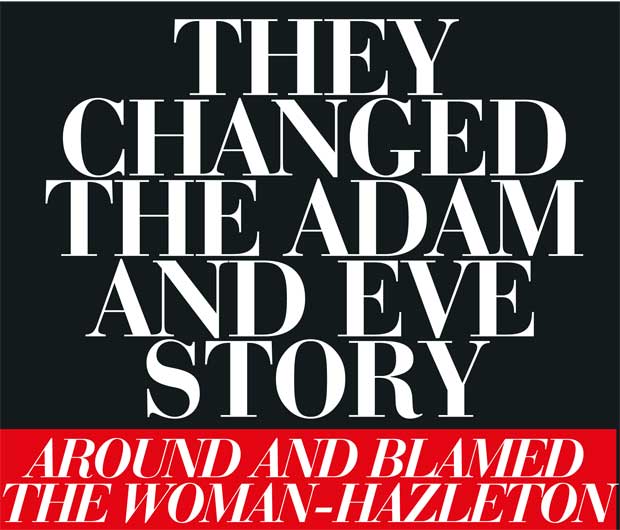
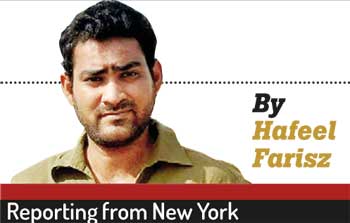 book ‘After the Prophet’ which details the tragic story of the Sunni- Shia split, is considered the most lively and historically accurate portrayal of the Islamic world commencing from the death bed of Prophet Muhammad. Hailed by academic and literary circles alike, Hazleton’s work is best known for its historical accuracy and for its compelling grasp of the environment in which the characters emerge- resulting in compelling and riveting narrative story telling.
book ‘After the Prophet’ which details the tragic story of the Sunni- Shia split, is considered the most lively and historically accurate portrayal of the Islamic world commencing from the death bed of Prophet Muhammad. Hailed by academic and literary circles alike, Hazleton’s work is best known for its historical accuracy and for its compelling grasp of the environment in which the characters emerge- resulting in compelling and riveting narrative story telling. 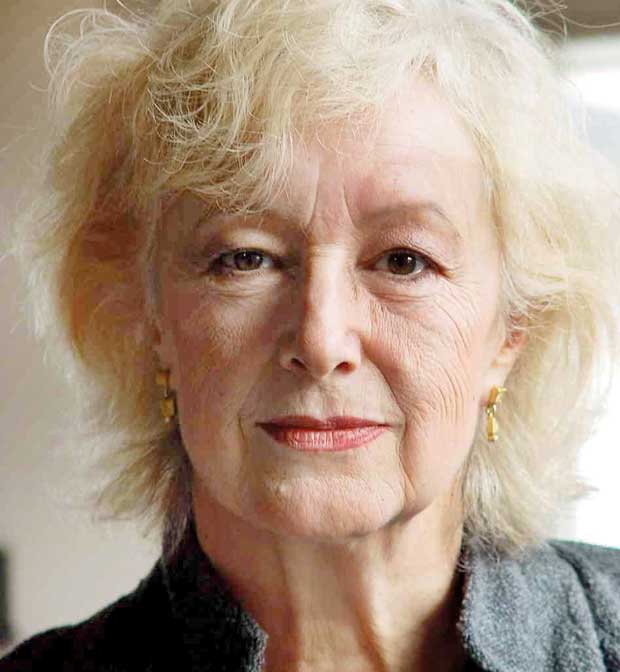
(laughs) It’s one of those lives that doesn’t fit into any narrative. I was born in England and got out as soon as I could. I then Lived in Jerusalem for 13 years, after which I moved to New York City and lived for 13 years. Then came to Seattle for what I thought would be 13 years but I’ve actually doubled that. Here I am after all that living on a shack on a raft, also known as a Houseboat- bordering on the edge of the continent, half way around the world- where I write about a lot which is the Middle East.
And you know what? It is kind of perfect. It gives me perspective, because when you are in the middle of things it is very hard to get perspective. But when you are half the world away and yet know the place intimately- when I say intimately- it is not only the politics and not only the people- but the feel of the place, the sense of the place.
I guess you can say that I’ve been living a kind of ‘double life’- by which I don’t mean that one life is secret and the other not. I mean two lives at once. That’s how it felt when I was writing that whole series of biographies about figures from Mary to Muhammad. Figures from half the world and half the history away. But when I write, I come down and sit at my desk here at my house here on the lake, looking out at water and the mistiness that is Seattle and I sort of instantly transport into the deserts of the Middle East. It is being in two places at once.
The easy answer and I stress- the easy answer- is my own childhood. I was the only Jew in a 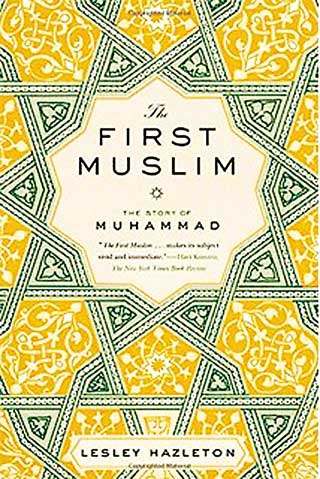 convent school in England. On the one hand there was the Catholicism at school and on the other, there was the fairly orthodox Judaism at home. The interesting thing is that it didn’t do what you would have thought it would do. Which would’ve been for me to walk away and say ‘a pox on all your houses’- I have nothing to do with religion in the future.
convent school in England. On the one hand there was the Catholicism at school and on the other, there was the fairly orthodox Judaism at home. The interesting thing is that it didn’t do what you would have thought it would do. Which would’ve been for me to walk away and say ‘a pox on all your houses’- I have nothing to do with religion in the future.
But that is not what happened. What happened was, it set up, this sort of fascination with the hold that religion has. This goes very deep and is very emotional. I know people tend to think that religion is a matter of belief- that you have to ‘believe’ something. But the whole point of the idea of believing something, is that belief holds within itself the possibility of disbelief. Because you only have to believe something if you don’t know it for sure. If you know it- you know it. We know that the earth is round- you don’t ‘believe’ the earth is round, unless you are stuck in the 10th century or something. We know its round so you don’t need to ‘believe’ it.
Belief is really trying to convince yourself that what you hope for- or what you think, or what you place your trust in, is actually so. And that is called faith. It’s not belief, it is called faith. And faith I think is wonderful. It is this leap beyond reason, . It is an act of courage. You know this is not rational but you place your faith. If I lend you a 100 bucks I do it in the good ‘faith’ that you will pay me back. I have no guarantee that you will pay me back. It is an act of trust in you right? And I think this is wonderful and that this is what makes us human. But if I absolutely ‘believe’, if I try and convince myself 100% that you will pay me back- that is kind of nutty isn’t it?. Does that make sense?.
Let’s get one thing clear. The institution of Religion is man-made. And I emphasize ‘Man’ made, because women had a very little hand in it. . But, if you are religious it is a reflection of who you are. You can read the Bible or the Quran or any other sacred text and you can find in them reflections of who you are. If you are filled with hatred or violence then you will focus on those passages which you interpret as advocating hate and violence. If what you want is a life of love and peace, then you will focus on those passages.
And you know both are available in all these texts. I mean these texts are not a matter of logic, they are not a matter of reason- that is why they have such a deep hold on us. Because they are mysterious and contradictory, and full of paradox. Today we tend to think of religion in the same way fundamentalist tend to think of religion. As this very set system of rules and laws that you have to obey and abide by, and if not you will be going to hell or whatever the equivalent of hell might be. But you know there are whole other ways of thinking about religion, where all these rules and laws are just institutional infrastructure.
They are just the beams but what is actually inside (religion) is what you bring to it. And that is a much wider concept, a much more open concept. It has to do with values and identity. You know people think religion is a matter of belief, but I disagree with that. I think it is a matter of identity. Of how you see yourself in the world. We all have many facets to our identity. I am Jewish, and I am agnostic, I’m feminist, and I’m a writer, I’m a psychologist- I can go on and on like this. These are all different facets of my personality and all of these come together in this one person. If you take any one of these facets away, I would be somebody else. But if any one of these facets comes under attack, then that facet which is under attack comes to the fore. When you identify yourself by only one (facet), then you are really limiting yourself to something very small.
The magic to me is in the variety of ways in which we identify ourselves. Imagine being Iraqi or Syrian, what does it mean now to be Iraqi or Syrian when those states hardly exist? So you fall back on older, wider forms of identity like religion. So if you look at the divisiveness between Shia and Sunni Muslims, you will see that when it comes to the fore, when it gets expressed most violently, is when the larger framework has broken down. When people can no longer identify themselves as Syrian or Iraqi- then they fall back to these much more older identities, these much more emotional ones. And this of course is manipulated. It is manipulated immensely by various interested parties, both political and religious. And one of the reasons religion is so easy to manipulate is because it is not a matter of rationality or reason. It is a very deep emotional matter of identity, of tradition and of loyalty to that tradition.
I am a psychologist and am also a writer, so I have a sense of story. A sense of narrative. So, let’s take Mary, that’s 1st Century Middle East. My questions are deceptively simple. Who was she really? Not the sort of statue in blue silk robes or the other similar images we have of her. But who was she really? This 13 year old peasant girl in 1st century Galilee under Roman occupation. When 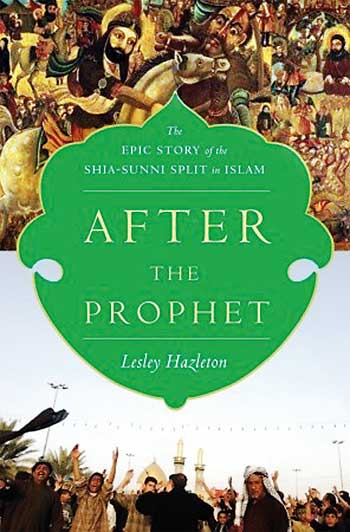 you frame the question that way- who must she have been? Obviously I can’t know for sure, but I can recreate who she was not only on the basis of what we have in the Gospels, which is very little, but also on the basis of Middle Eastern history, of Anthropology, of knowing the terrains, psychology and the use of empathy in placing yourself in the shoes of somebody else and of mythology also. I try to bring all these things together instead of taking only one source.
you frame the question that way- who must she have been? Obviously I can’t know for sure, but I can recreate who she was not only on the basis of what we have in the Gospels, which is very little, but also on the basis of Middle Eastern history, of Anthropology, of knowing the terrains, psychology and the use of empathy in placing yourself in the shoes of somebody else and of mythology also. I try to bring all these things together instead of taking only one source.
I would use the term multi disciplinarily but that sounds terribly academic. What I really wanted to do was to bring her back to life. To give her flesh and blood,. To make her real. And I did the same thing basically with Muhammad, who is such a revered figure that sometimes it made me feel like he was being dehumanized. The Muslims idea of Muhammad is of such reverence, that he is called the perfect man. I don’t believe in perfection. Perfection is very boring. Muhammad had the most amazing life, a really dramatic life with amazing achievements. He is one of the most influential figures in all of history and I believe changed his world and is changing our world today.
Yet, each time I read a 19th or 20th or 21st century biography of him it was like taking a sleeping pill. I couldn’t fathom how one could make such a fascinating life so boring to read. Whether they were written as devotional biographies which are intensely boring or as academic biographies which tend to sort of tip-toe around, in the name of reverence, they didn’t bring across the real human being.
It is far easier to relate to a human being, surely. (laughs). Perfection just doesn’t do it for me. You see a perfect face and there is nothing there, there is nothing to relate to. But you read or think about a man born into enormous problems and disadvantages and battling his way into greatness How did he do this? What was he thinking along the way?
What actually happened on the night of the first revelation? Of course there is no way to know exactly, but you could try. We do have his own words from that time. Again I tried to recreate the man, recreate his reality, to recreate the world he lived in, and the world he thought in. To make him real. I wrote the book the ‘First Muslim’ for Non -Muslims, because I was very aware of this enormous ‘ Chutzpah’ (audacity/ impudence) of an agnostic Jew writing a biography of the Prophet of Islam. But my curiosity to understand the man was stronger than any kind of daunting aspect of it. So far as I knew, Muslims would not pay any attention to this. But it was enormously surprising, flattering and in a sense wonderful that so many Muslims have contacted me from all over the world and told me ‘thank you for making him real’.
Because I approached him as ‘A Man’ and not as ‘The Prophet of God’. As a man who became a Prophet. I have been asked many a time, - how could you write so well about Mary or Muhammad and not be a believer in either of the religions?
The Agnostics stance is one of inquiry. You are not looking for “The” answer. Because if you are agnostic there is no such thing- there are many forms of truth and many answers, all which give rise to perfect questions. There are no ultimate truths or ultimate answers. Many any of us try, especially fundamentalists, to pin everything down- “This is the answer, this is the truth, this is the meaning of life” etc., and secular people do it too. We talk of “The Universe” as if it’s some sort of thing, with limits and so on. Now we know there are billions of Universes, and there are many more we don’t know of, and many more we will never know of. We talk about “The Soul” as if it’s a definable thing- as some part of us which we could define and say ‘that is the soul’. But it’s a quality of being, a quality within us that we express.
We’ll leave divinity aside for a moment. We are talking of human experience. The Virgin birth story, is not specific to Christianity itself. It extends to many other mythologies including Greek and Roman ones.
Part of it really is due to the modern concept of how we view virginity today. We have reduced ‘virginity’ to the idea of one tiny little human membrane- the hymen. We forget what ‘Virginity’ was and meant at the time. It was the symbol of fertility, as in ‘virgin forest’. There is no forest more full of life than the ‘virgin forest’.
And this was the original meaning of ‘virginity’, it was fertility. And this we forget and this is what is so wonderful about the concept of Mary- the Virgin Mother, it is a fertility concept. You are going to ask me- alright was she really physically a virgin? To which all I can say is- get a sense of wonder people, get a sense of mystery because that is what religion is about. It is not about rules, or laws- it is about everything we can’t understand. So anyone who says that she was physiologically not virgin, has no sense of mystery, no sense of poetry. They are just reducing everything to the smallest possible denominator. Anybody who says that she absolutely was a virgin- has no sense of reason, it’s not rational. This is what I find most dismaying about fundamentalism, because it reduces these huge, wonderful issues of mystery and awe and everything we cannot understand- to something very small. It’s the way I talk about conviction. Fundamentalists speak with absolute conviction that they are right, but what we forget about conviction is that it’s not only being ‘convinced’ that you are right about something- to be ‘convicted’ is also to be imprisoned. Conviction belongs to a very small mind. Religion is filled with paradoxes and that is what is so wonderful about them. Sitting with the paradox, exploring the paradox, understanding the paradox is to me the wonder of it. That is the poetry of it. And Religion without poetry is fundamentalism.
What brought Muhammad alive to me was going back to the earliest sources. Going back to the earliest Islamic historians and meeting them. And they were writing 100 or 200 years after he died. That is the closest we can get, besides the Quran itself. And there are accounts there of the night of the revelation of the Quran on Mount Hira.
So, I mean, what you would expect from the standards we have now (from Muhammad) is ‘ Hallelujah; Him coming down from Mount Hira- bearing the truth and him floating on clouds and the sort. But that was not what happened. What happened was more human. He was terrified. What he saw, he experienced, was a revelation from God through Gabriel. Now you are going to ask me, ‘Did God actually speak to Muhammad’ or ‘ Did Muhammad imagine that God was speaking to him?’ And I say it doesn’t matter.
You respect his experience. This was what he experienced and it terrified him. It terrified him to the extent that his first reaction to think “oh no I must be mad, I must be out of my mind. This cannot be happening- not to me, an ordinary person like me. I cannot go back and be raving like a lunatic and so I’m going to throw myself off this mountain and put an end to it all”. Then the Angel came back and stopped him. Now this to me is a human reaction. I could see Muhammad as a human being. Yes this is the way it had to have been. It has a ring of truth to it. And this is what I mean about being a writer and being a psychologist. You go through all these accounts and some of them are written over in later dates, and written in piety and reverence and so on- it doesn’t work on a human level. But in some of them, you get an early sense, a very immediate sense of what happened and you think ‘ oh yes this I recognize, this is human, this is what must’ve happened’. And it is very exciting, after all this time, to be able to read through 14 centuries and find this humanness. I think that is terribly exciting.
Well, Jezebel for an instance is a fascinating historical morality tale. It’s not about human morality, but a morality tale of ‘who gets to write history’. If there was a morale to the story of Jezebel, it is never let your enemies write your story (laughs). Her story was written in the Bible in the two books of Kings two centuries after she died. And she became sort of the bad girl of the Bible. By the way it was fascinating writing about her, after writing about Mary- because in both instances, these were two women who had been dehumanized. On the one hand Mary- by being revered and sanctified and on the other hand Jezebel- by being reviled and demonized. And in the process both of them, the real person had disappeared completely. And it was the real person I wanted to get back to. Again I kept asking the very deceptively simple question ‘ who was she, who must she have been?’.
It was amazing to go back and realize that Jezebel was a Princess of the most advanced civilization of the time, it was 9th century BC- in this city state of the East Coast of the Mediterranean, what is now Lebanon. They were the most advanced in civilization- the first to create the alphabet and the Phoenician alphabet, which later became the basis for the Hebrew alphabet with which the Bible was written. She was married off… she comes to Israel, and there was this sort of cultural imperialism. It was like when a dominant power takes over economically and politically.
The story is very dramatic itself and she is completely demonized. But this demonization has to do is with the politics of the time in which her story was written- 200 years later. It is a magnificent story, about Prophet Elijah. ‘The’ major Prophet of all the Hebrew Prophets and she faces him down. And what does he do? He runs from her, in terror. He runs all the way down to Sinai and complains to God and says ‘help me this woman is awful, what can I do?’ and so on, and God says ‘ that’s it’ to Elijah and sacks him. And then Prophet hood is given to Elisha. Elisha is completely ruthless. It’s a great standoff between this very proud Phoenician Princess and this very Old Style Biblical Prophet and she wins.
This is what a lot forget- that she wins. She loses in the long run of course, because of retribution and all that. But after her and her husband the Kingdom and Israel go to pieces. Resulting in the ‘Exile’. It was in Babylon that the story was written by those who blamed her (for the exile). Because of course you always blame the woman (laughs) something which goes back to Adam and Eve.
That is what is so amazing when you go back to the earliest sources. Because you go back prior to the takeover of the religions by the bearded old men, [when] the women are still there where the women play very vital roles. So you have Aisha , after Muhammad dies, his youngest widow- leading an army of ten thousand men against his Son In Law and cousin Ali. Whether you agree with Aisha or not, it is really not relevant. I mean look at her. She is right there in the middle of the battle, sitting on top of a Camel- after which the Battle is named, hurling these blood curdling war cries. And you think wow this is not the image of Muslim women that I had. She was very forthright, very outspoken and central to the whole story of the Shia- Sunni split. Central to what happens in the 50 years after Muhammad’s death. And it is fascinating to rediscover history this way, to delve underneath all these accretions and accumulations of the centuries. To get beyond all these ‘editing outs’ and ‘deletions’ over the centuries and get back to what it really was. That is when you get these wonderful stories.
That whole story of the Shia- Sunni split is amazing. Islam- as Muhammad founded it, was the religion of unity. ‘ One God, one people’ was the Principle. And the one thing he and everybody around him was most eager to avoid was ‘ fitnah’. And yet you follow that whole story of what happened in those 50 years- where everybody is terrified of fitnah, yet despite It being the one thing you most want to avoid -with every step they take it is the one thing they bring closer. Now if this not a human story, if this no Greek tragedy, then what is?.
I’ll let you in on a secret. Neither have many Western Scholars( laughs). They don’t go back to the sources. Because if you do go back and read them- it is amazing. The detail in theirs- all the juice of real life is there. Everything that is missing from these modern biographies, are all there. We tend think ‘ old history is boring’. It is totally the other way with Islamic history. The further back you go, the earlier you go- the more exciting it becomes. They are more redolent of real life. These are oral histories. Ibn Ishq and Al Thabari were just travelling around getting people’s memories. They would have twenty different versions of the same event- twenty different people telling them about this one scene from a battle, and each one (of the people telling them) had got their own style of storytelling. And if you have a sense of the history, language, culture and terrain you could tell which ones are true, and which ones are edited. They are so lively. There is one where this young boy was coming out of the tent to fight and somebody recalls “ The buckle of his sandal was undone, the left one I think”. And you can just hear it right?. Another one says “ I saw the sun glinting off the loop earring of his ear”. These kinds of details are so real. You feel like you are there. I have a lot of respect for these two men, they are the most extraordinary historians I know of.
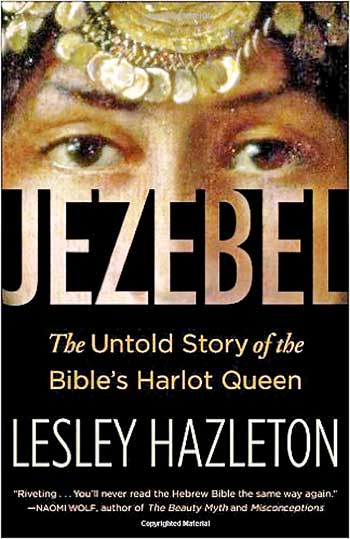 Q Earlier you spoke of the story of Adam and Eve relating it to how the woman was blamed or left out. It is a phenomenon that you see in all Abrahamic religions and even in Eastern religions. How does this happen?
Q Earlier you spoke of the story of Adam and Eve relating it to how the woman was blamed or left out. It is a phenomenon that you see in all Abrahamic religions and even in Eastern religions. How does this happen?There is Adam and there is Eve and there is the Apple of the tree of knowledge- knowledge!!! Eve reaches to the Apple of the tree of Knowledge. I mean say that to anybody now – they will say ‘wow that’s great, what the hell is wrong with Adam? Doesn’t he want knowledge?’.But that doesn’t happen, they turn the story completely around. She becomes the bad one for reaching for knowledge and he becomes the good one for not reaching it ( laughs).
Oh that’s a long story. We could see it in early Judaism, Christianity and Islam. The way the power structures developed, after- after, the central figures were dead. And the women got pushed aside. In early Christianity by the way, there were women Bishops. It was politics and women obviously lost out. But on the other hand if you go to Greek and Roman religions or even Samarrian religions or Egyptian mythology, women played a hugely important role which changed over time. Now why is an excellent question and there are a few more books to be written about that.
Well, it depends on what ‘time’. During the time of Mary or the time of Muhammad, religion was not separate from politics, from identity from tribe and so on. It was integrated. In fact there was no concept of religion as something separate. It was all part of you who were. It didn’t require belief, just simply acceptance. There was far less tied around with laws and rituals. It was tradition. It was never a matter of belief. So when Muhammad ,for instance, was travelling around the Arabian peninsula and tribe after tribe was pledging allegiance to him, there was no insistence that they became religious Muslims. He didn’t insist on it at all. All they had to do was pledge allegiance to him and his conception of God. And this they did. Because his conception of God ‘ Allah’, which is exactly the same word and meaning of ‘ El’ in Phoenician or ‘ Elohim’ in Hebrew- Al- Lah ,the high one, already existed. It wasn’t a new concept. One of the brilliant things about Muhammad is that he adopted frameworks which already existed in Arabia brought them together in a new way. Allah was already the high God in the Arabian Peninsula and there were many subordinate gods, tribal totems. And the question was about the relationship between the tribal totems with the high God, and his insistence was that there was only one God. What has happened now though, is that we have made religion an institution of itself. And people imagine all religions are and should be the same thing. There are different ways of being a Buddhist, a Christian and a Jew. When fundamentalist say ‘ there is only one way to practise’, they are lying. They are trying to insist by being so loud and violent, they are trying to impose their extremist version. And it is the duty of all of us- those who are religious and those who aren’t to resist them with all our might.
That is like asking if poetry is relevant? Is it relevant in the same way as food and shelter? No. But is that ( food and shelter) all there is to life? No. It is relevant when it comes to answering the unanswerable, great big existential questions. ‘ What am I doing in this world?’, ‘ what is the meaning of all this?’ and so on. Of course they aren’t rational questions, but if we limit ourselves to purism, we are going to become very small indeed. I know Atheists like Hitchens ( Christopher) and all that describe religion as the source of all the evil in the world. His concept of religion was fundamentalism. That’s a straw God, it is very easy to attack fundamentalism. Religion is the way in which the wonder, the mystery and the sense awe of being in this world is expressed. I think it’s wonderful. This is not in the sense of religious institutions, but in the sense of what you would call spirituality- that makes us larger as human beings.

Add comment
Comments will be edited (grammar, spelling and slang) and authorized at the discretion of Daily Mirror online. The website also has the right not to publish selected comments.
Reply To:
Name - Reply Comment
US authorities are currently reviewing the manifest of every cargo aboard MV
On March 26, a couple arriving from Thailand was arrested with 88 live animal
According to villagers from Naula-Moragolla out of 105 families 80 can afford
Is the situation in Sri Lanka so grim that locals harbour hope that they coul